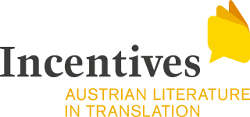de en fr span cz
The Silence of the Glaciers.
Sample text (pp. 101-9)
Magnusson sends the waiter away without having ordered anything.
'We've got problems with the Bároarbunga. But I want to help you. I'll send you to the Vatnajöküll glacier with a team from National Geographic, you can do a photo trip there and tell them everything. I'll pay for the helicopter. But I won't appear in the story. The National Geographic team has been informed, and the flight leaves in one hour. You'll have exactly one hour up there. After that the chopper will fly directly over the Bároarbunga because I need the data measured there. That'll please you.' (…)
As the helicopter takes off I can see a figure in the swirling snow; it's waving to us or rather waving us away. It looks like – but it can't be – it looks like Snow. I nudge the professor beside me at once, to signal to him that he should look out of the window. But by the time he reacts the snow has become an opaque mass. The headphones are pressing heavily on my ears; with my belt on and in a thick snowsuit I feel completely captive. There is no up and no down. The chopper flies straight through the air, in my stomach all I can feel is the speed. What's the meaning of that? What can Snow want here? I must inform the others immediately. The hour's flying time is an eternity, everything is spinning in my head. We've fallen into a trap. We fly over a glacier which looks like a field with furrows. One crevasse after another in the glacier. At last we reach a flat area of the glacier and the chopper flies towards it.
When we are hovering over the area the helicopter prepares to land, we jump out one after the other. The last ones to hop out into the cold are the National Geographic man and his assistant. We are standing up to our hips in snow. What happens then is exactly what I have feared: the helicopter takes off.
We stare after it until it disappears on the horizon.
(…)
On the next day we tramp in silence through the snow. We couldn't make a start until nearly nine o'clock, before that it was dark. We've got six hours, then this endless blackness will surround us again. The professor leads the caravan, nobody dares to think about crevasses. We don't have a rope to tie us to one another. The professor sets a fair old pace, the snow is hard, we can slide along on it. Only occasionally does someone's foot break through the snow and drop deep into the névé. They let me go last, I can step on the trodden-down path. A couple of times we have to climb over smallish barriers of ice, we pull each other up the ice walls, we have to walk round larger obstacles. I think of the Bisson brothers, one of my favourite pictures shows the members of the expedition climbing over blocks of ice, with wooden sticks and a ladder as their only pieces of equipment. The wooden ladder is lying across a crevasse, a mountaineer is kneeling on it. What I would give to have a ladder now! I stand still twice in order to shoot a photo of our caravan. But my hands are trembling with cold and exhaustion, nothing comes of the photos.
(…)
We get a signal twice more, but so briefly that we receive only data. Again it's not good enough for telephoning, but we can correct our route. 'We'll need two more days,' the professor says. His tea is still just saving our lives at the moment, but we won't be able to hold out for much longer without food. While we are drinking, Robert, the National Geographic photographer, tries to keep up out spirits by telling stories. He tells us that the first tourists in the Alps used to take with them one indispensable accessory: a concave hand-mirror. When they were standing in front of a picturesque panorama they would take it out and admire the view through the tinted mirror. That transformed the view into an artistic painting. And that apparently gave these romantics more pleasure than the actual scene. For anyone who was still not surprised enough by this little trick those inventive mountaineers had something else up their sleeves to crown the experience of being on the summit. A shot fired from a pistol and the way the sound resounded around the mountains was the ultimate reward for the trials and tribulations of the climb. At least that was the theory. But the higher the glacier the softer the sound released by the mountain. The bang was stifled before it could spread around. Many mountaineers also failed in their earnest attempt to sing the national anthem on the summit. The mountain swallowed up the first sound as soon as it came out of their mouths. Open mouths were all the respect they showed to their own nation. The glacier maintained its silence.
© 2017 Editon Atelier, Vienna
© English translation: Leigh H. Bailey, 2017
>> Incentives






